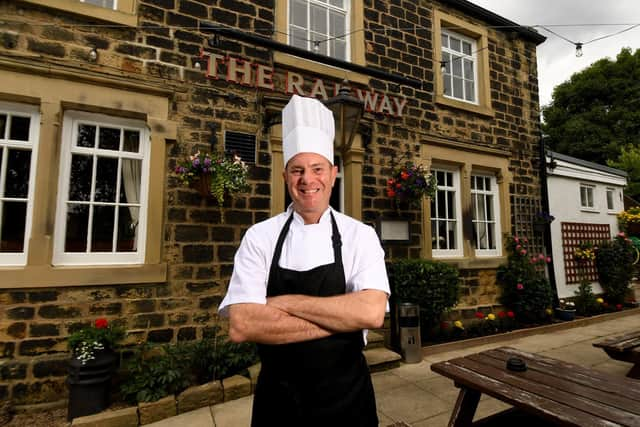Leeds pub The Railway Inn forced to lay off chef and close the kitchen due to rising food and fuel costs
and live on Freeview channel 276
Chef Garth Kirsten-Landman joined The Railway Inn in Rodley, Leeds, in 2020.
South-African born Garth had previously worked as a pub landlord himself, running pubs across the UK, before deciding to become a chef.
Advertisement
Hide AdAdvertisement
Hide AdHe worked at the Old Bell Tavern and The Swan, both in Harrogate, before a stint at Wagamama's and then as a shelf-stacker at Asda during the pandemic when the pub was shut.


His role at The Railway Inn has now been made redundant after the pub owners were forced to close the kitchen.
The Railway Inn, in Rodley, Leeds, shared the news on their social media pages on Sunday, August 28.
In a statement, the owners of the pub, said: "We are saying goodbye to our chef Garth today.
"We have had to make some tough decisions.
Advertisement
Hide AdAdvertisement
Hide Ad"Unfortunately our kitchen will be closed from now and the foreseeable future this is because fuel and food costs are rising out of control.
"We wish you well for the future and know you will give 110 per cent to whatever you decide to do."
Customers rallied in support of Garth and to wish him luck.
Selina Adams said: "Oh that’s so sad. What a shame. A cruel world when an amazing pub has to stop serving food! Nothing better than your food and drink after a long canal walk", while
Niall Quinn added: "Oh no that’s not good news. Such a sad outcome and Gareth will be missed. What is happening to the world?"
Advertisement
Hide AdAdvertisement
Hide AdThe pub is located on Calverley Bridge right next to the Leeds Liverpool Canal.
It is very popular with families and dog walkers.
Before the change it served traditional pub food such as fish and chips, pie and peas, chilli and a selection of burgers, as well as pizzas.
Industry bosses have warned that pubs and breweries across the UK are at risk of closure within months amid price hikes upwards of 300 per cent.
Bosses of six of the UK’s biggest pub and brewing companies have signed an open letter to the Government urging it to act in order to avoid “real and serious irreversible” damage to the sector.
Advertisement
Hide AdAdvertisement
Hide AdGreene King, JW Lees, Carlsberg Marston’s, Admiral Taverns, Drake & Morgan and St Austell Brewery all sounded the alarm on Tuesday, August 30.
Out of control gas prices following the invasion of Ukraine by Russia have contributed to rocketing energy bills for operators.
On Friday, regulator Ofgem confirmed that bills for an average UK household would surge by 80 per cent in October when the new price cap comes into force.
However, businesses operate without a regulated price cap, with some pub owners warning that their bills have quadrupled or are struggling to even find suppliers willing to power their venues when contracts come up for renewal.
Advertisement
Hide AdAdvertisement
Hide AdWilliam Lees Jones, managing director of the JW Lees pub group, said: “We have publicans who are experiencing 300 per cent plus increases in energy costs and some energy companies are refusing to even quote for supply.
“In some instances, tenants are giving us notice since their businesses do not stack up with energy at these costs.
“These are not just pubs but people’s homes and the hearts of the communities that they sit in.
“Government needs to extend the energy cap to business as well as households.”
Advertisement
Hide AdAdvertisement
Hide AdNick Mackenzie, chief executive officer of 2,700-strong group Greene King, said one tenant has seen their energy bill jump £33,000 for the year.
He said: “While the Government has introduced measures to help households cope with this spike in prices, businesses are having to face this alone, and it is only going to get worse come the autumn.
“Without immediate government intervention to support the sector, we could face the prospect of pubs being unable to pay their bills, jobs being lost and beloved locals across the country forced to close their doors, meaning all the good work done to keep pubs open during the pandemic could be wasted.”
The bosses, who sit on the board of British Beer and Pub Association (BBPA) have demanded the Government implement an urgent support package that effectively caps the price of energy for businesses.
Advertisement
Hide AdAdvertisement
Hide AdIt comes as knock-on effects from rising energy bills are also impacting the sector, with CF Fertilisers, one of the UK’s biggest CO2 producers, revealing it will halt production at its remaining UK ammonia site due to rocketing costs.
Brewers have warned that they could face disruption if there is a shortfall in supply of CO2, which is used in the production of some beer.
Emma McClarkin, chief executive of the BBPA, said: “This rise in energy costs will cause more damage to our industry than the pandemic did if nothing is done in the next few weeks, consumers will now be thinking even more carefully about where they spend their money.
“There are pubs that weathered the storm of the past two years that now face closure because of rocketing energy bills for both them and their customers.”
Advertisement
Hide AdAdvertisement
Hide AdA Government spokesperson said: “No government can control the global factors pushing up the price of energy and other business costs, but we will continue to support the hospitality sector in navigating the months ahead.
“That includes providing a 50 per cent business rates relief for businesses across the UK, freezing alcohol duty rates on beer, cider, wine and spirits and reducing employer national insurance.
“This is in addition to the billions in grants and loans offered throughout the pandemic.”